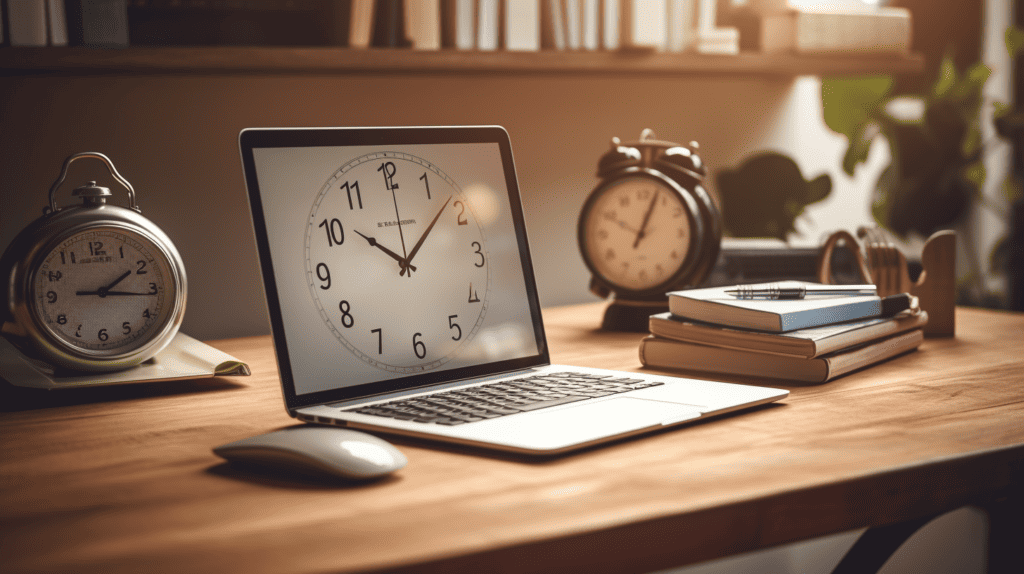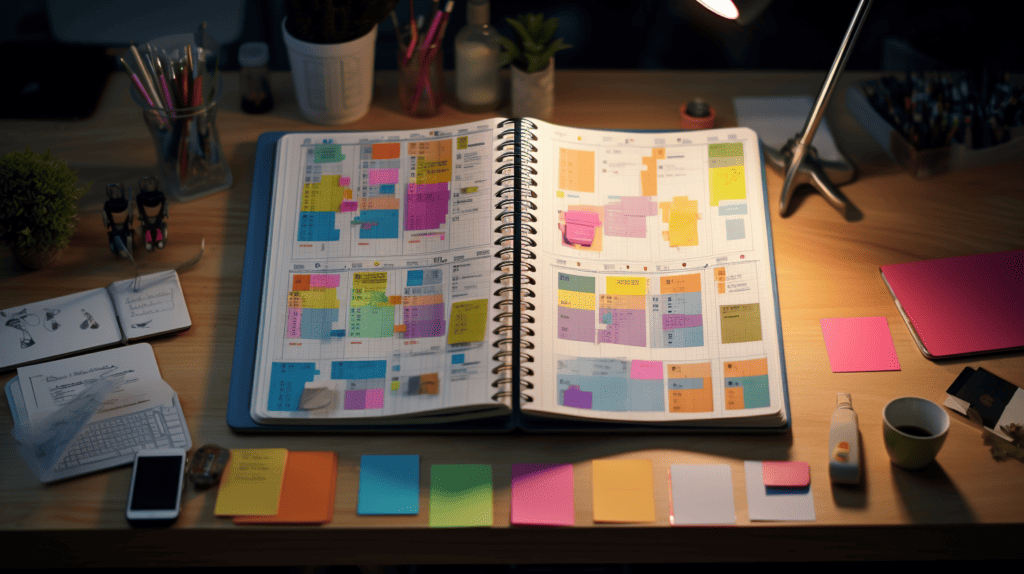As a previous high school student, I understand how overwhelming it can be to balance school work, extracurricular activities, and personal life. That is why prioritizing activities for high school students is essential.
Learning to manage time effectively is key to achieving academic success and maintaining a healthy work-life balance.
Key Takeaways
- Prioritizing tasks helps to manage time effectively
- Effective time management improves academic performance
- Balancing academics and extracurricular activities is crucial
- Goal setting is important for staying focused and motivated
Importance of Time Management for High School Students
As a high school student, managing your time effectively can be challenging. Between classes, homework, extracurricular activities, and maintaining a social life, it’s easy to feel overwhelmed and fall behind. That’s why developing good time management skills is essential to your success.
Effective time management can improve your academic performance by allowing you to prioritize important tasks, avoid procrastination, and make the most of your study time. It can also help you stay organized and reduce stress levels, ultimately leading to a better overall quality of life.
So, how can you improve your time management skills? The key is to develop effective study habits and develop a plan to balance your schoolwork with other responsibilities and activities.
Importance of Effective Study Habits
Developing effective study habits is crucial to successful time management. By creating a study schedule and finding a suitable study environment, you can optimize your focus and maximize productivity.
Start by creating a weekly study schedule that allocates specific times for studying each subject. Be sure to include breaks and time for extracurricular activities and personal pursuits. This will help you stay on track and avoid wasting time.
Next, find a study environment that works for you. This may mean finding a quiet place away from distractions or using noise-canceling headphones to block out noise. Creating a comfortable and distraction-free study environment will help you stay focused and make the most of your study time.
Organizing Your Schoolwork
Another important aspect of time management is organizing your school workload. Start each day by making a to-do list of tasks that need to be completed. Prioritize the most important tasks and break them down into smaller, manageable steps.
Use a planner or calendar to keep track of important dates and deadlines, such as due dates for assignments and exams. This will help you stay on top of your schoolwork and avoid last-minute cramming or missed deadlines.
By developing good time management skills, you can achieve success in school and beyond. With effective study habits, organization, and balance, you can make the most of your time and achieve your goals.

Balancing Academics and Extracurricular Activities
As a high school student, balancing academics and extracurricular activities can be challenging, but it is essential for long-term success. Doing well in school is crucial for future opportunities, but extracurricular activities can also provide valuable experiences and help build important skills. Here are some strategies for balancing both:
- Plan your schedule: Create a schedule that includes time for both academic and extracurricular activities. Be sure to include time for rest and relaxation to avoid burnout. Prioritize your commitments and make sure to allocate enough time for each.
- Communicate with teachers and coaches: If you are struggling to balance your commitments, communicate with your teachers and coaches. They may be able to offer support or flexibility to help you succeed in both areas.
- Stay organized: Keep track of deadlines and commitments using a planner or calendar. Make sure to plan ahead for upcoming tests, projects, or competitions to avoid last-minute stress.
- Choose quality over quantity: It’s better to focus on a few extracurricular activities that you are truly passionate about rather than trying to do too much. This allows for more time to dedicate to each activity and can lead to more meaningful experiences.
- Be realistic: It’s important to set realistic expectations for yourself and your workload. Don’t overcommit or take on too much at once. It’s okay to say no to certain opportunities if they don’t align with your goals or schedule.
- Take breaks: Make sure to take regular breaks to recharge and avoid burnout. This can be as simple as taking a walk outside or listening to music. Taking breaks can actually improve productivity and help you avoid getting overwhelmed.
By planning ahead, staying organized, and being realistic, you can successfully balance academic and extracurricular commitments. Remember to communicate with teachers and coaches and prioritize your own well-being to ensure long-term success.
Setting Goals for Success
As a high school student, it’s important to have clear goals in mind to stay focused and motivated. Setting goals can help you prioritize your time and efforts, making sure you’re working towards something meaningful.
When setting goals, it’s essential to make them SMART: Specific, Measurable, Achievable, Relevant, and Time-bound. Your goals should be specific, outlining exactly what you want to achieve. They should also be measurable, so you can track your progress and stay motivated. Make sure your goals are achievable, but also challenging enough to push yourself. Additionally, your goals should be relevant to your overall vision for the future. Lastly, set a deadline for each goal to create a sense of urgency and accountability.
Remember, goal setting is not just about academic achievements. You can also set personal goals related to skills you want to learn or hobbies you want to explore. Whatever your goals may be, make sure they align with your values and passions.

Effective Study Habits
Developing effective study habits is crucial for high school students to excel academically. As I mentioned earlier, creating a study schedule is the first step towards effective time management. However, it’s equally important to find a suitable study environment.
Some students prefer studying in complete silence, while others find it helpful to have some background music or ambient noise. Experiment with different environments to determine what works best for you.
Active learning strategies can also help improve retention and comprehension. These strategies include taking notes, summarizing information, and practicing self-testing. Try incorporating these techniques into your study routine to enhance your learning.
Remember to take breaks and stretch your legs every once in a while. Taking regular short pauses can improve focus and productivity.
Lastly, don’t hesitate to seek help when needed. Your teachers, parents, and peers are all valuable resources when it comes to academic success.
Managing Stress and Avoiding Burnout
As a high school student, it’s common to experience stress and burnout due to the academic workload, extracurricular activities, and personal responsibilities. However, it’s important to manage stress and avoid burnout to maintain overall well-being and academic success.
One effective strategy for managing stress is to practice relaxation techniques, such as deep breathing exercises, guided meditation, or yoga. These techniques can help calm the mind and body, reducing the physical symptoms of stress.
Another technique is to prioritize self-care activities, such as getting enough sleep, eating a balanced diet, and exercising regularly. These activities can boost mood and energy levels, helping to relieve stress and improve overall well-being.
Recognizing Burnout
It’s also important to recognize the signs of burnout, such as feelings of exhaustion, decreased motivation, and reduced academic performance. If these symptoms occur, it’s essential to take a break and engage in self-care activities, such as spending time with loved ones or pursuing a hobby.
Additionally, seeking support from a trusted friend, family member, or mental health professional can be beneficial for managing stress and avoiding burnout. They can provide valuable guidance and support, helping to alleviate stress and prevent burnout.
Overall, managing stress and avoiding burnout is essential for high school students to maintain their academic success and overall well-being. By practicing relaxation techniques, prioritizing self-care activities, recognizing burnout, and seeking support, students can effectively manage stress and achieve success.
Allocating Time for Personal Life
As important as school and extracurricular activities are, it is equally crucial to allocate sufficient time for personal life. Taking breaks and indulging in hobbies can help you relax and avoid burnout. Here are some strategies for balancing school responsibilities with personal life:
- Create a schedule that includes time for hobbies and relaxation
- Find an activity that you enjoy and make time for it regularly
- Make time for socializing with family and friends
- Learn to say “no” to commitments that may interfere with your personal time
Remember that taking care of your mental and physical well-being is just as important as excelling in academics and extracurricular activities. By allocating time for personal life, you can recharge your batteries and come back focused and refreshed.

Developing Strong Time Management Skills
Time management is a crucial skill for high school students to develop to ensure academic success and maintain a healthy work-life balance. Here are some additional tips and techniques for developing strong time management skills:
Prioritize your tasks
Creating a to-do list or prioritizing tasks based on their importance can help you stay organized and focused. Start by identifying the most crucial tasks for the day or week and work your way down from there.
Utilize technology
Using digital tools such as calendars or apps can help you stay on top of deadlines and keep track of your schedule. Consider using apps like Trello, Evernote, or Google Calendar to stay organized.
Seek support when needed
Don’t be afraid to ask for help when needed. Whether it’s from a teacher, parent, or peer, getting support can help alleviate stress and improve your productivity.
Organize your school workload
Organizing your school workload can help you stay on top of assignments and projects. Consider breaking down larger assignments into smaller, more manageable tasks, and setting deadlines for each step along the way.
By prioritizing tasks, utilizing technology, seeking support when needed, and organizing your school workload, you can develop strong time management skills that will benefit you throughout high school and beyond.
Maximizing Productivity and Efficiency
As a high school student, it’s essential to make the most of your time. Here are some strategies to maximize your productivity and efficiency:
- Try the Pomodoro Technique: This technique involves breaking work into 25-minute intervals, followed by 5-minute breaks. Repeat this cycle four times and take a longer break of 15-20 minutes before starting again. This method helps to increase focus and manage time effectively.
- Minimize Distractions: Social media, notifications, and other distractions can disrupt your work and reduce productivity. Turn off all notifications, mute your phone, and use website-blocking software to help remove distractions.
- Effective Task Prioritization: Prioritize tasks based on importance and deadline. Use a to-do list or planner to keep track of your daily tasks and activities. This helps you focus on critical tasks and ensures you complete them on time.
With these strategies, you can increase your productivity, manage your time effectively, and achieve success in high school.
Conclusion on Prioritizing Activities for High School Students
Prioritizing activities and managing time effectively is crucial for high school students to achieve success and maintain a healthy work-life balance. By implementing the tips and tricks shared in this article, students can improve their time management skills and develop effective study habits. Remember to set SMART goals, balance academic and extracurricular activities, and allocate time for personal life while minimizing stress and avoiding burnout.
Don’t hesitate to seek support from teachers, parents, or mentors when needed. By utilizing technology, minimizing distractions, and prioritizing tasks, students can maximize their productivity and efficiency. Remember, effective time management is a skill that can be developed with practice and determination. Good luck on your academic journey and remember to take care of yourself along the way.
FAQ on Prioritizing Activities for High School Students
Q: What are some tips for prioritizing activities for high school students?
A: Some tips for prioritizing activities for high school students include creating a to-do list, determining the importance and urgency of tasks, and breaking down bigger tasks into smaller, manageable ones. It is also important to set realistic goals and deadlines and to learn to say no to commitments that may overload your schedule.
Q: Why is time management important for high school students?
A: Time management is important for high school students because it helps them stay organized, meet deadlines, and reduce stress. It allows students to effectively balance their academic workload, extracurricular activities, and personal life. Good time management skills also contribute to improved productivity and academic success.
Q: How can high school students balance academics and extracurricular activities?
A: High school students can balance academics and extracurricular activities by creating a schedule that allocates time for studying, attending classes, and participating in extracurricular activities. It is important to prioritize tasks, communicate with teachers and coaches, and learn to manage time effectively.
Q: Why is goal setting important for high school students?
A: Goal setting is important for high school students because it helps them stay focused, motivated, and organized. Setting goals provides a sense of direction and purpose, and it allows students to track their progress and celebrate their achievements. It also helps in prioritizing tasks and managing time effectively.
Q: What are some effective study habits for high school students?
A: Some effective study habits for high school students include creating a study schedule, finding a suitable study environment, taking regular breaks, using active learning techniques, and reviewing material regularly. It is also important to minimize distractions, seek clarification when needed, and practice self-discipline.
Q: How can high school students manage stress and avoid burnout?
A: High school students can manage stress and avoid burnout by practicing self-care techniques, such as getting enough sleep, eating a balanced diet, and engaging in physical activity. It is also important to prioritize tasks, manage time effectively, and seek support from family, friends, or school counselors when needed.
Q: How can high school students allocate time for their personal life?
A: High school students can allocate time for their personal life by setting boundaries, creating a balance between school and personal responsibilities, and prioritizing activities that bring them joy and relaxation. It is important to schedule time for hobbies, socializing, and maintaining healthy relationships.
Q: What are some additional tips for developing strong time management skills?
A: Some additional tips for developing strong time management skills include prioritizing tasks based on importance and urgency, utilizing technology tools for organization, and seeking help or delegating tasks when needed. It is also important to avoid procrastination, break big tasks into smaller ones, and establish a routine.
Q: How can high school students maximize productivity and efficiency?
A: High school students can maximize productivity and efficiency by using techniques such as the Pomodoro Technique (working in focused intervals with short breaks), minimizing distractions (e.g., turning off notifications), and prioritizing tasks based on importance and urgency. It is also important to take care of physical and mental well-being and to practice self-discipline.





Leave a Reply